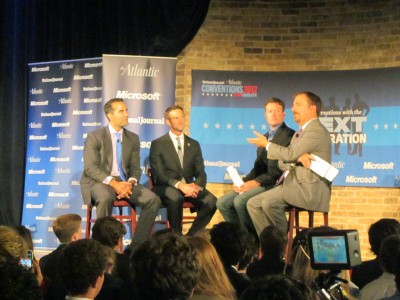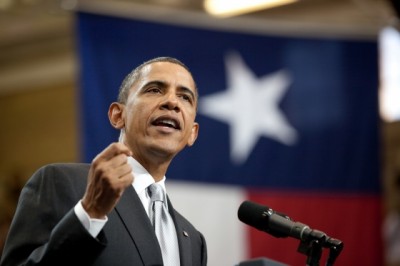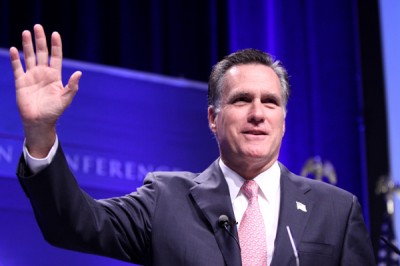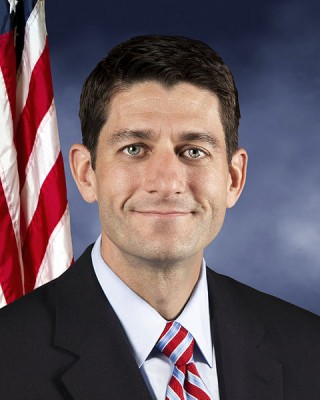
From the convention: Local control versus national standards
One of the starkest differences between Republican and Democratic education platforms came to light in a series of panels that focused on two issues that presumably concern the millennial generation most: jobs and education. At “Conversations with the Next Generation,’’ Republican voices clamored for more local control of schools and less federal government mandates, while […]
One of the starkest differences between Republican and Democratic education platforms came to light in a series of panels that focused on two issues that presumably concern the millennial generation most: jobs and education.

From left to right: George P. Bush (Jeb Bush’s son), Representative Aaron Shock (R- Ill.), National Journal’s Jim Tankersley and NBC’s Chuck Todd – speaking at Conversations with the Next Generation. (Photo by Sarah Butrymowicz)
At “Conversations with the Next Generation,’’ Republican voices clamored for more local control of schools and less federal government mandates, while Democrats and former D.C. public schools Chancellor Michelle Rhee argued the opposite. The event was sponsored by The Atlantic and National Journal, and underwritten by Microsoft.
Rhee said it’s impossible to really know how students are doing, with each state having different standards and tests.
“We have to have – I think – national standards, a national assessment, so we can have an apples-to-apples comparison,” Rhee said.
But before Rhee spoke, Josh Romney, one of Republican nominee Mitt Romney’s five sons, promised his dad would give “as much power as he can back to the states” while George P. Bush, the son of former Florida Gov. Jeb Bush, noted that “education is best managed at the local level.”
Representative Aaron Shock (R- Ill.) also called for the federal government to stop increasing subsidies for higher education. He argued that when someone else is paying, people are less likely to notice the cost. Shock said increasing the amount of Pell grants could not solve skyrocketing college tuition.
The rest of the event underwritten by Microsoft, revolved around education topics that often receive bipartisan support. Bush even said that he thinks current Secretary of Education Arne Duncan should be able to keep his position – regardless of who wins in November.
Many panelists found common ground on the idea that teachers must be paid more in order to attract the top college students into the profession.
“High achieving young people do not want to go into a profession where … their value doesn’t count,” Rhee said. She also spoke of the need to change laws to open up the teaching profession to those who have not gone through a traditional teacher training program, but have other experiences.
At the secondary and post secondary level, speakers generally agreed that school needs to be more relevant to students — and that there needs to be a stronger connection between degrees awarded and workforce needs.
Part of the responsibility lies on universities to improve the advice they give students, Shock said.
“A lot of young people lack the appropriate amount of counseling at the four-year university level,” he said. “It’s not in [the university’s] interest to counsel young people on return of investment.’’
Shock did not offer an easy solution.
“I’m not saying there’s a silver bullet,” he said. “If this was simply a bill that needs to be passed or a law that needs to be written it would have been taken care of long ago.”
From the convention: GOP platform considers school choice a ‘consumer right’
The Republican Party voted on its official platform Tuesday, calling for more local control and less government spending in education. The platform is similar to Mitt Romney’s proposed education policies in many ways, including a plan for federal money to follow low-income and special-needs students to the school – public or private – that they […]
The Republican Party voted on its official platform Tuesday, calling for more local control and less government spending in education. The platform is similar to Mitt Romney’s proposed education policies in many ways, including a plan for federal money to follow low-income and special-needs students to the school – public or private – that they choose to attend.
The platform frames the school choice issue as one of “consumer rights in education.” It supports options such as home schooling, virtual schools and vouchers. The document also singles out career and technical education programs as a way to “retrain and retool the American workforce.”
Republican support for more school choice extends to higher education. They have advocated for the expansion of private training schools, online universities and work-based learning in the private sector.
The platform includes a call for abstinence-only sex education, support of English-only education and a jab at unions. “We support putting the needs of students before the special interests of unions,” the document says. (Two paragraphs later, however, the document says America’s teachers “should be protected against frivolous litigation,” a statement the unions would likely argue is among their top priorities.) Republicans also voted to support “programs that support the development of character and financial literacy” and “an accurate account of American history that celebrates the birth of this great nation.”
Although the platform does not include many specifics, it does claim “we know what works.” Among the ideas that Republicans say have been proven to make a difference in education are also Democratic talking points, including accountability for administrators and teachers, transparency about school performance and merit pay.
Claims about education reforms supported by both party have not always been supported by research, however: For example, the practice of basing a teacher’s bonus or salary on how well their students perform has yet to show any effect on student achievement.
From the convention: Education and the first night’s speakers
The theme Tuesday night for the Republican National Convention was “We Built It,” and speakers stuck to a script focused on jobs, the economy and the importance of small business—with very little mention of education. When the topic was broached, it was to draw a clear line between Republicans and Democrats, who often share more […]
The theme Tuesday night for the Republican National Convention was “We Built It,” and speakers stuck to a script focused on jobs, the economy and the importance of small business—with very little mention of education. When the topic was broached, it was to draw a clear line between Republicans and Democrats, who often share more common ground in education policy than in other issues.
Governor Chris Christie (R- N.J.) argued for a simple distinction between the parties in his highly anticipated keynote address
“They believe in teachers’ unions. We believe in teachers,” said Christie, echoing a common critique of the Obama administration made even by Republicans who agree with the basics of the President’s policies but maintain he has bowed to union pressure.
Christie touted his record of taking on teachers’ unions; he has had bitter feuds with them in New Jersey over tenure and education spending.
“We believe that the majority of teachers in America know our system must be reformed to put students first so that America can compete,” Christie said in his speech. “Teachers don’t teach to become rich or famous. They teach because they love children.”
Democrats, he said, “believe that the educational establishment will always put itself ahead of children.”
Sen. Rick Santorum (R-Pa.) also addressed education directly, saying it should be “the second rung on the ladder to success,” following stable marriages and families.
“President Obama’s solution has been to deny parents’ choice, attack private schools, and nationalize curriculum and student loans,” Santorum said. “Mitt Romney believes that parents and the local community must be in charge—not the Department of Education.”
Although Obama has been criticized by Republicans for not refinancing the Washington, D.C., voucher scholarship program, he has been a staunch supporter of charter schools. In his signature Race to the Top initiative, states were rewarded for raising charter school caps.
Obama is also often accused of being responsible for the Common Core State Standards, which lay out K-12 standards in English and Math; 48 states and the District of Columbia have adopted them. Although Obama’s administration supported the Common Core, in part through Race to the Top, the standards were developed by a nongovernmental group.
When Romney’s wife, Ann, touched on education in her speech, she had this to add: “Under Mitt, Massachusetts schools were the best in the nation. The best.”
From the convention: Education reform will require ‘getting ready for a fight’
Former D.C. Schools Chancellor Michelle Rhee called for classroom teachers unhappy with the system to brace themselves for battle. She spoke during a panel following the showing of “Won’t Back Down,” a film to be released this fall about a parent and teacher fighting to take over a failing school. “There is a difference in […]
Former D.C. Schools Chancellor Michelle Rhee called for classroom teachers unhappy with the system to brace themselves for battle. She spoke during a panel following the showing of “Won’t Back Down,” a film to be released this fall about a parent and teacher fighting to take over a failing school.
“There is a difference in my mind between teacher union leadership and rank-and-file teachers,” she said, adding that most teachers got into the profession wanting to have a positive impact. Fixing problems, she said, is “going to require teachers steeling themselves up and getting ready for a fight.”
“Won’t Back Down” features Maggie Gyllenhaal as the parent of a dyslexic daughter with a clearly incompetent teacher, and Viola Davis as a teacher who is convinced to try to shake up the system. Together, they work to get 50 percent of parents and teachers on their side to take advantage of a “fail-safe” trigger law that allows parents to take over a failing school. Along the way they battle the teachers’ union and school-board bureaucracy.
The film was shown at an event sponsored by Rhee’s advocacy organization, StudentsFirst, and the Foundation for Excellence in Education, a group founded by former Florida Gov. Jeb Bush.
“Won’t Back Down” has already been criticized for ignoring realities of the education system and overinflating the efficacy of parent trigger laws. These laws, which in theory allow a school takeover if 50 percent of parents sign a petition demanding so, have yet to be successfully implemented. In the past two years, such laws have been passed in seven states. Despite some attempts, no school has undergone a takeover as a result.
Given that, critics of the film question the claim that it was inspired by true events. But in the panel discussion director Daniel Barnz didn’t pretend it was based on a true story. “We tried to channel a fundamental truth about parents who can’t wait,” Barnz said, adding that he drew upon newspaper articles and other stories in crafting the film, which he described as a “utopia.”
“I’m a sucker for David-and-Goliath stories,” Barnz said. “What I really wanted to emphasize in the film is how people can work together.”
There is room in parent trigger laws for people to do just that, said Bush, one of the panelists discussing the film. “This is the one little Switzerland where the left and the right can agree,” he said.
But the parent trigger law doesn’t do enough, Bush said. He called for greater increases in school choice across the board, which is part of Romney’s education policy.
Rhee said she was unhappy that, despite both candidates taking clear stances on many education issues, the topic largely has been untouched on the campaign trail. “We are not talking about this issue nearly enough in this presidential election,” Rhee said. “I would hope we try to force the issue more.”
From the convention: American Federation for Children and the push for school choice
Republicans in Tampa did more Tuesday than tally the state roll call. The party also voted on its official platform for the rest of the campaign season. In education, the GOP platform spells out its support for school choice, “whether through charter schools, open enrollment requests, college lab schools, virtual schools, career and technical education […]
Republicans in Tampa did more Tuesday than tally the state roll call. The party also voted on its official platform for the rest of the campaign season. In education, the GOP platform spells out its support for school choice, “whether through charter schools, open enrollment requests, college lab schools, virtual schools, career and technical education programs, vouchers or tax credits.”
It’s similar to what Mitt Romney has described in his education white paper, in which he calls for low-income and special-education students to be able to attend any school.
The inclusion was a victory for the American Federation for Children, a national group that advocates the expansion of school choice. At the convention, The Hechinger Report talked with Randan Swindler, the federation’s director of external affairs, to learn more.
Q: What do you think about what Mitt Romney has proposed around school choice?
A: We’ve actually been working with the platform committee to finalize getting school choice on the platform – on the Republican platform. We’re very supportive of Governor Romney’s position on school choice. He’s kind of an all-in kind of guy. He supports parental choice through charter schools, through vouchers, through tax credits, scholarships. And we would just really encourage him to expand on that in his presidency if he were elected.
What do you think of what President Obama has done over the past four years?
He’s definitely expressed some support for giving parents choices. It was a little bit disappointing that he didn’t reinvest in the D.C. Opportunity Scholarship Program. We had to fight for that but it has been reauthorized, which was something that we supported. But we would definitely like to see him use stronger language to support parental choice and back away from the unions and find ways that he’s actually supporting parents as opposed to playing the union line.
The Hechinger Report recently did a story about Louisiana’s voucher program and one issue raised was that many schools teaching questionable things might be eligible for vouchers. What do you say to that?
It’s up to the parents. As a parent, it’s a personal responsibility, looking at the curriculum. It’s just another option for parents, so we’re not going to get involved in saying what schools can and cannot teach. We want them to be accountable and transparent for the parents so that they have the options that they need to make the best decisions for their kids.
This interview has been edited for length and clarity.
From the convention: What would happen to education under Obama or Romney administrations?
The Obama campaign has recently begun highlighting the differences between his education agenda and that of Mitt Romney. Will these new talking points be a theme at the Republican and Democratic nominating conventions? The Hechinger Report will be on the ground in Tampa and Charlotte to find out. Up until last week, education was rarely […]
The Obama campaign has recently begun highlighting the differences between his education agenda and that of Mitt Romney. Will these new talking points be a theme at the Republican and Democratic nominating conventions? The Hechinger Report will be on the ground in Tampa and Charlotte to find out.

President Barack Obama delivers remarks on higher education and the economy at the University of Texas in Austin, Texas August 9, 2010. (Official White House Photo by Pete Souza)
Up until last week, education was rarely addressed on the campaign trail. But the stakes for the future of the U.S. education system are high in this election: The Elementary and Secondary Education Act (ESEA), which funds and delineates the federal government’s role in the nation’s schools, will most likely be reauthorized in the next four years.
The last revision of the bill, President George W. Bush’s No Child Left Behind Act (NCLB), has been heavily criticized for its reliance on standardized tests and seemingly unattainable standard of universal proficiency by 2014. President Obama would ease up on some of the law’s restrictions, but maintain a robust federal role in local schools. Romney would move to reduce the government’s investment and involvement in education.
President Obama and Romney do share some common ground in their education platforms; both support charter schools, for example, and merit pay for the country’s best teachers. They both also speak of our failing schools and the pressing need to prepare American students for global competition. But the paths they would take to do this differ in important ways.
The Obama administration has largely used a carrot-and-stick approach to changing the education system. Over the past six months, the Department of Education has granted waivers from NCLB penalties to 26 states in return for promises that they will introduce other education reforms and accountability measures.
Under Obama’s Race to the Top initiative, a competition in which states promised a series of changes to their education systems in return for federal money, an unprecedented number of states are overhauling how teachers are evaluated, paid and let go.
Some Republicans have criticized Obama’s education initiatives as overreaching by the federal government. Although Romney would not eliminate the Department of Education – as President Ronald Reagan once sought to do – he would consolidate the agency with another or “perhaps make it a heck of a lot smaller,” he told donors in April.
Under a Romney administration, school choice would be a priority. The Obama administration has thrown its support behind charter schools – awarding some points in Race to the Top for states that raise caps on the number of charters. Romney, though, wants to see a school choice system that includes vouchers for private schools in addition to more charters. Romney’s white paper on education calls for low-income and special-needs students to be able to go to any school, public or private, of their choice, using funds from the federal government.
Romney’s support of private sector involvement in education extends into higher education. He wants to allow private bank involvement in student loans (Obama eliminated their role in March of 2010). He has also praised for-profit, private colleges and campaigned on their campuses. Romney argues that for-profit schools increase competition in the post-secondary landscape and can help keep the cost of college down.
The Obama administration is one of many critics of for-profits, arguing that they leave graduates with large loans and few employment opportunities. Under Obama, the Department of Education developed regulations that will pull federal financial aid from schools where graduates are unable to find “gainful employment.” Romney would repeal this.
Due to Tropical Storm Isaac, the Republican National Committee Convention is off to a slow start; all speeches for the evening have been postponed until later in the week. Starting tomorrow, check in with The Hechinger Report this week and next for analysis of speeches, coverage of off-the-floor convention events and exclusive interviews with national education leaders.
Ed in the Election: New York group tries to tie Romney to anti-union group
A New York-based group released a report this week trying to tie Mitt Romney to StudentsFirstNY, an education organization known for opposing teachers unions and supporting Mayor Michael Bloomberg’s often controversial education policies. StudentsFirstNY is a local offshoot of a national organization founded in 2010 by Michelle Rhee, former chancellor of the District of Columbia […]
A New York-based group released a report this week trying to tie Mitt Romney to StudentsFirstNY, an education organization known for opposing teachers unions and supporting Mayor Michael Bloomberg’s often controversial education policies.
StudentsFirstNY is a local offshoot of a national organization founded in 2010 by Michelle Rhee, former chancellor of the District of Columbia Public Schools. In New York, the organization has pledged to raise $50 million in the next five years to support Bloomberg’s education policies, such as eliminating seniority-based layoffs for teachers.
The report, published by New Yorkers for Greater Public Schools, charges that “Romney donors and Republican insiders” plan to “control NYC education.” According to the report, which is titled “studentsfirstROMNEY FIRST,” StudentsFirstNY board members and funders have given more than $2 million to Romney and super PACs affiliated with the candidate.
The report’s authors warn of school closures and personnel reductions, arguing that “StudentsFirst NY is using a plan developed by Bain & Company and advocating actions that will treat public schools the way Romney’s Bain Capital treated companies.” (Romney served as CEO of Bain Capital from 1984, when he co-founded it, until 2002; he also served as interim CEO of Bain & Company in 1991-92.)
StudentsFirst dismissed the validity of the report. “Virtually every line in this report contains charges that range from absurd to dishonest,” Glen Weiner, the deputy executive director of StudentsFirstNY, wrote in a statement, according to The New York Times. “Clearly, the teachers’ union is so desperate to suppress a serious conversation about improving teacher quality and expanding school options for kids that it has set up a front group to threaten elected officials and concoct conspiracy theories.”
The Times pointed out that the report is “somewhat selective,” noting that the StudentsFirstNY board also includes members who donate to Democrats.
Meanwhile, President Barack Obama spent some time on the campaign trail talking to teachers in Iowa. “The main thing I wanted to do is just say thank you. … I know how tough it is to be a teacher,” he said, according to Politico. “I know you guys get a lot of satisfaction. Obviously you guys don’t do this for the money.”
Obama also spoke about the long overdue re-authorization of the Elementary and Secondary Education Act (known under President George W. Bush as the No Child Left Behind Act). Its re-authorization has been stalled since 2007. Obama said the new bill his administration has been crafting would “maintain the best spirit of No Child Left Behind.” While many educators and advocates have extensively criticized NCLB, the law has also been praised for its emphasis on measuring the achievement of many student subgroups.
“But we want greater flexibility,” Obama added.
Ed in the Election: Where does Paul Ryan stand on education issues?
Mitt Romney’s pick of Rep. Paul Ryan (R-Wis.) as his vice presidential candidate over the weekend offers new clues about what a Romney administration could mean for federal education policy. Although Ryan hasn’t made education a signature issue during his seven terms in Congress, he believes the federal government should cut back its involvement in […]
Mitt Romney’s pick of Rep. Paul Ryan (R-Wis.) as his vice presidential candidate over the weekend offers new clues about what a Romney administration could mean for federal education policy. Although Ryan hasn’t made education a signature issue during his seven terms in Congress, he believes the federal government should cut back its involvement in education.
“Stagnant student achievement levels and exploding deficits have demonstrated that massive amounts of federal funding and top-town interventions are not the way to provide America’s students with a high-quality education,” says Ryan’s website. “It is imperative, then, that we allocate our limited financial resources effectively and efficiently.”
Ryan is perhaps best known for the federal budget he proposed in April 2011, which included deep cuts to the federal Head Start program. Given his views on the federal role in education, Ryan would probably also cut other programs. Secretary of Education Arne Duncan said the budget could have “disastrous consequences for America’s children,” telling Congress it would include cuts to Title 1 funding for schools that serve low-income children. Republicans countered that this was speculation on Duncan’s part, according to Education Week.
In contrast to his running mate, Ryan opposed a measure that prevented student-loan interest rates from doubling this summer, from 3.4 percent to 6.8 percent. Both Romney and Obama agreed that Congress needed to act to keep the interest rates from jumping. (Ryan did vote for a plan to extend the 3.4 percent interest rate for another year, however.) The move was paid for by cutting part of Obama’s Affordable Care Act.
Ryan has also repeatedly voted for or proposed limiting funding and eligibility for Pell grants, which go to low-income college students. In his proposed budget, for instance, the eligibility requirements for Pell grants would be tightened so fewer students would qualify for them. And the amount of each Pell grant would not keep pace with inflation under Ryan’s plan, according to The New Republic.
Vouchers, which would subsidize students who choose to attend private schools, are a centerpiece of Romney’s education platform. Ryan voted to extend a Washington, D.C., voucher program that the Obama administration attempted to cut. (It was allowed to expire in 2009 before being reauthorized in 2011.)
Romney’s choice for a running mate was immediately blasted by the country’s teachers unions. American Federation of Teachers President Randi Weingarten, who has already endorsed President Obama for re-election, released a statement calling a Romney-Ryan ticket “the most out-of-touch … in decades.”
“Rep. Ryan’s record speaks for itself,” Weingarten said. “He would reduce, not expand, real opportunities for all students to have access to high-quality public education.”
Ed in the Election: Biden at the AFT and Romney’s VP options
Vice President Joe Biden attacked Mitt Romney and other Republicans’ views on education Sunday in a speech to the country’s second largest teachers union. Addressing about 2,500 delegates from the American Federation of Teachers at the group’s national conference in Detroit, Biden spoke of Romney as someone who would make cuts to education in favor […]
Vice President Joe Biden attacked Mitt Romney and other Republicans’ views on education Sunday in a speech to the country’s second largest teachers union. Addressing about 2,500 delegates from the American Federation of Teachers at the group’s national conference in Detroit, Biden spoke of Romney as someone who would make cuts to education in favor of tax breaks for the rich, according to the Associated Press.
Specifically, Romney supports GOP plans to cut funding for college student loans and the Head Start preschool program, Biden said.
“We believe you rebuild a country from the middle out. [Republicans] think it has to come from the top down,” he said. “Unlike our Republican friends, we don’t see you as the problem. We see you as the solution.” The AFT has already endorsed President Barack Obama for re-election.
The Romney campaign argued back that Biden’s speech showed the Obama administration did not stand up to teachers unions. “Instead of putting students first, this administration has put the union bosses that fund their political campaigns ahead of what’s best for our children,” said spokesman Sean Fitzpatrick.
Governors at a Colorado gathering of the Republican Governors Association—some of whom are thought to be on the list of potential vice-presidential candidates for Romney—praised Romney and the GOP’s policies in general. As speculation of whom Romney will ultimately select for his ticket continues, some have pointed out that he has several options with a track record of prioritizing education reform, such as Gov. Bobby Jindal of Louisiana.
At the Colorado event, Jindal and Gov. Susana Martinez of New Mexico both discussed the improvements their states had made in education and voiced their support for Romney’s education platform.
“We cannot have the world’s greatest economy, we cannot have the world’s greatest quality of life and the world’s greatest military unless we reform our education systems,” Jindal said, according to the Los Angeles Times.
Ed in the Election: Romney’s student loan plan and Obama’s improv
Mitt Romney, if elected president, would once again shake up the student-loan market, according to The Washington Times. Since March 2010, under legislation pushed by the Obama administration, private-sector banks haven’t had a role in federal loans, which now come directly from the U.S. government. While the Obama administration says the move saves students money, […]
Mitt Romney, if elected president, would once again shake up the student-loan market, according to The Washington Times. Since March 2010, under legislation pushed by the Obama administration, private-sector banks haven’t had a role in federal loans, which now come directly from the U.S. government.
While the Obama administration says the move saves students money, Romney advisors have argued that there are problems with it.
Romney “is not interested in re-creating the previous program,” Scott Fleming, a member of Romney’s education policy group, told The Times. “He is simply looking for affordable and efficient alternatives to replace a system that relies exclusively on Treasury borrowing that leaves American taxpayers at risk for an increasing default rate.”
Meanwhile, President Barack Obama veered off script this week when talking about education during his address to the National Urban League Convention in New Orleans. After hitting some of his usual talking points—how his administration has invested in early childhood programs, led lots of states to change policies around teacher effectiveness, and tried to make higher education more affordable through tax breaks and expanded Pell grants—Obama introduced the “first-ever White House Initiative on Educational Excellence for African Americans.”
The initiative, officially established Thursday, will create a new office dedicated to coordinating community and federal work aimed at helping African-American students get through high school and on to college and careers.
“Of course, that means all of you all have got to hit the books,” Obama said, to laughter.
“I’m just saying. Don’t cheer and then you didn’t do your homework,” he continued, to applause and more laughter. “Because that’s part of the bargain, that’s part of the bargain—America says we will give you opportunity, but you’ve got to earn your success. You’re competing against young people in Beijing and Bangalore. They’re not hanging out. They’re not getting over. They’re not playing video games. They’re not watching Real Housewives. I’m just saying. It’s a two-way street. You’ve got to earn success.”
And then, to even more laughter and applause, Obama said: “That wasn’t in my prepared remarks. But I’m just saying.”






